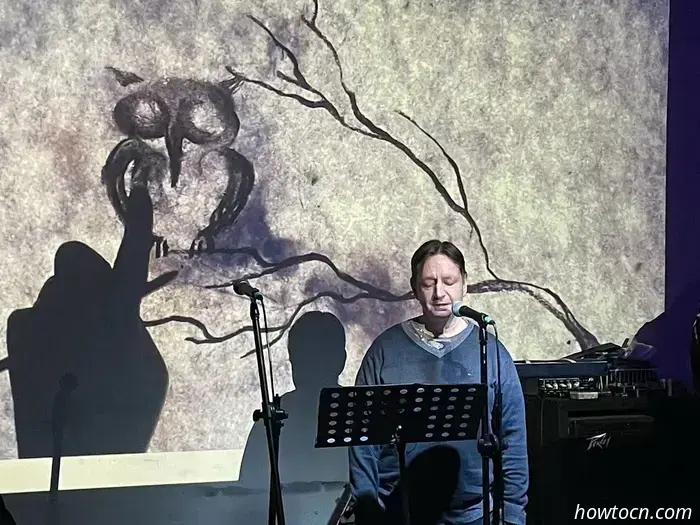
I always emphasize that the key to thriving in Beijing lies in discovering your own community. It could be anything, like a local group of ant farmers. Having a community provides essential structure and a sense of belonging in your life here. As for mine? I've never regretted aligning myself with the literary scene in Beijing, which has introduced me to remarkable individuals like David Harrison Horton. Horton, originally from Detroit, Michigan, arrived in China in the early 2000s, armed with an MFA in Poetry from Mills College (Oakland, CA), and he has made Beijing his home. You can frequently find him reading his work at Spittoon Poetry Night, unless he's preoccupied with composing new poems or editing his zine, Saginaw, which he generously gives away to anyone interested.
He is a humble yet inspiring person, always possessing a gentle demeanor. You'll notice this if you attend the upcoming event, Beijing Poets at The Hutong this Saturday (Sep 13) from 4 PM to 5:30 PM. Tickets are priced at RMB 50, a worthwhile investment, as Horton will be sharing the stage with fellow poets Feniá G. and Anthony Tao. I hope they forgive me for spotlighting Horton today in honor of his new poetry collection, Necessary. I haven’t completed the book yet; it's akin to savoring a fine bottle of wine rather than gulping it down quickly.
Poetry often has a reputation for being inaccessible, mysterious, or difficult to grasp. From what I've seen so far, Horton's Necessary doesn't provide straightforward stories or simple symbols. Instead, it invites readers to immerse themselves in intense and incisive poetry. In this new work, Horton skillfully commands language and presents poetry with confidence. There are no unnecessary embellishments; rather, there's a deep exploration of time, place, and connection, weaving together various moments in history into a richly layered reflection on how we understand the spaces we inhabit within “inherited and unfolding narratives.”
American poet, critic, and writer Stephen Ratcliffe has referred to Necessary as "indeed necessary reading for anyone who wants to know what's really going on in China these days." Personally, I would prefer to sit down with the poet himself for a conversation. Dear reader, I invite you to join me this Saturday at The Hutong. You won’t find a better plan for your Saturday.
Hello, David. I hope people grab every last copy of Necessary from you this Saturday. I sense you generally adopt a free-spirited approach to understanding literature, and by extension, poetry. This implies that we don't necessarily need grandiloquent academic terminology to articulate our reading experiences; instead, we should simply engage with a text and let it resonate with us. How would you describe that?
I like to think that my approach to reading and meaning-making is open. Each of us approaches a text with different backgrounds, experiences, and perspectives. My interpretation of a text holds significance for me but is likely to vary, perhaps significantly, from how others interpret and derive meaning from it. This opens up avenues for discussion and contemplation. There isn't just one correct way to read a text, especially in literature, and that’s part of the enjoyment for me.
A central idea I kept in mind while working on Necessary was the concept of palimpsest, where newer writing overlays older texts, sometimes allowing the original text to emerge. We uncover fragments of text and sources intertwined with a contemporary narrative. For instance, I reference the Babylonian goddess Tiamat, which I first encountered through poet Elizabeth Willis, who herself drew from earlier sources, leading back to the ancient texts. How do we extract meaning from its current iteration given our present circumstances? There are several approaches. We can view Tiamat as part of a collage and analyze how it interacts with what surrounds it now. We can examine seemingly contrasting elements and consider their relationships. There isn’t a single "right" method, so I encourage having fun with it. It might involve spending varying amounts of time on different lines as you navigate through it, and that’s perfectly acceptable.
That's great advice for readers. Now, let's discuss the poet. Your poetry in Necessary is polished and distilled to its essentials. As a fellow writer, I often fear unnecessary elaboration. Do you have any guidance on this?
In her endorsement for the book, poet Elizabeth Robinson described me as "a writer of some restraint." I was initially taken aback by that remark, but now I see how it fits this book. I began writing Necessary shortly after arriving in China. Over two decades, I have revisited it many times, refining the language to what I deemed essential for flow, effect, and meaning. I also aimed for each nine-line section to converse with the other parts of the book, crafting a compact unit that amplifies the overall effect and meaning, creating a shadow of narrative and atmosphere.
That serves as a timely reminder that literary creation takes time. Speaking






A conversation with David Horton in anticipation of tomorrow's Beijing Poets event at The Hutong.